Iranian Defense Minister Says Regime's Power Is Unmatched
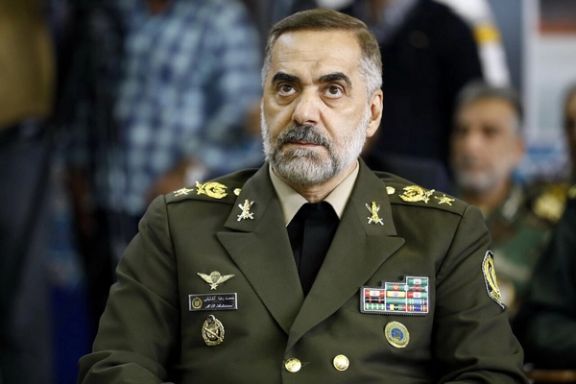
Iranian regime's Minister of Defense, Mohammad Reza Ashtiani, claimed that no country in the world is able to confront the Islamic Republic of Iran.

Iranian regime's Minister of Defense, Mohammad Reza Ashtiani, claimed that no country in the world is able to confront the Islamic Republic of Iran.
Apparently referring to Iran's long shoreline on the Persian Gulf and the Sea of Oman, Ashtiani claimed Iran's power derives from its strategic location.
Tensions have been rising as Iran and its ally, Hezbollah, have increased their rhetoric against Israel. However, they have refrained from opening new fronts against Israel following a strong warning from Washington.
Israel's retaliation against Hamas, which is supported by Tehran, was triggered by a terror attack last month that claimed the lives of 1,400 people and resulted in more than 200 individuals being taken hostage. Israel's response has included a retaliatory campaign, which extended to a ground offensive last week. While Hamas authorities in Gaza claim that more than 9,000 people have been killed, this figure has not been independently confirmed and may be part of the Islamist group's psychological warfare.
Regarding efforts to attribute the October 7 attack on Israel to Iran, Ashtiani stated, "The Islamic Republic of Iran is influential in the regional and global context, and the world is aware that we possess high capabilities in various fields, making us an influential country."
Israel, which Iran refuses to recognize, has long accused Iran's clerical rulers of stoking violence by supplying arms to Hamas and exerting control over the Gaza Strip, as well as supporting militants in Syria and Lebanon. Tehran maintains that it provides moral, financial, and logistical support to the groups.
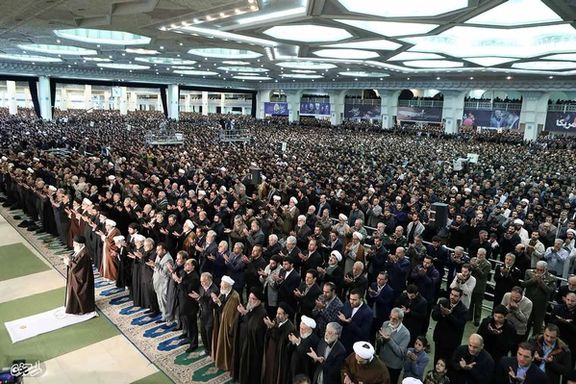
Friday Imams in Iran echoed Supreme Leader's anti-US rhetoric in their sermons in a concerted move on the anniversary of the 1979 takeover of the US Embassy in Tehran.
On November 4, 1979, pro-Khomeini Islamist and leftist students occupied the US embassy and took hostage more than 50 US diplomats for 444 days.
In their sermons, Iran's Friday Imams generally blamed the United States for the war in Gaza ignoring the fact that it was Hamas that launched the October 7 terror attack on Israel and the United States has reacted by expressing support for Israel.
In Qom, home of the country's largest Shiite seminary, Friday Imam Mohammad Saeedi claimed that "Iran has struck a hard blow against the United States with its Death to America slogan." Saeedi added: "This is not simply a slogan. It is a revolutionary strategy."
Pointing out that the Friday prayers came one day before the anniversary of the seizure of US embassy in Tehran, Saeedi said, "The takeover of the US spy den was a manifestation of this strategy."
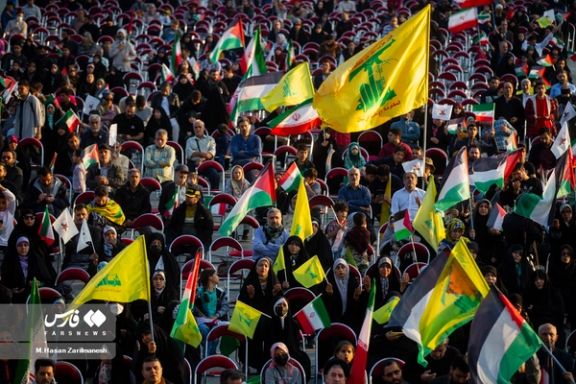
The cleric echoed Supreme Leader Ali Khamenei's criticism of the United States for supporting Israel.
In Karaj, near Tehran, Friday Imam Mohammad Mehdi Hosseini said, "The Death to America slogan ensures the Islamic Republic's authority. If it is taken away from us, we will lose our international influence." He added: "This slogan has created a strategic link between Iran and other countries and created a large front."
Hosseini further threatened, "If the Supreme Leader allows us, we will create a storm in the region." He claimed that the confrontation during the past 40 years between Iran on the one hand, and Israel and the United States on the other is an outcome of the Islamic Republic of Iran's influence, power and strategic depth.
He stated that the current war in Gaza is not about Israel and Palestinians, it is a war between what is right and what is wrong.
The Friday Imam of Isfahan, Mojtaba Miordamadi expressed hope in his sermon that "The United States will be destroyed soon." He also included Israel in his hate speech saying, "I hope the America and criminal Israel are going to be destroyed soon, and God gives us the good news about the annihilation of the Zionist regime."
Referring to Khamenei's statement on Thursday that "Israel would have not been able to resist against Palestinians for even one week if it weren't for the US military support," Mirdamadi said, "Israel has been weakened and its death is approaching despite the arrogant world's support."
In Mashhad, firebrand cleric Ahmad Alamolhoda said the United States is so unclean that it is “not to be touched” and added, "The United States is the filthiest point in the world. It is hated by the whole world and no one sees any value in it."
Alamolhoda added, "None of the Islamic governments in the region dares to normalize their ties with America anymore." In one of his most elaborate anti-Semitic comments, he claimed that "Jewish people do not believe in God's power." He further stated, "It is part of Israel and the United States' philosophy that human beings should only think of their own desires." He added, "Zionism inspired United States imperialism and its world-devouring nature."
Alamolhoda utterly distorted Iran's modern history, saying, "It was the United States that sent Ruhollah Khomeini, the founder of the Islamic Republic, into exile in 1964." He continued his fabricated version of history by claiming, "The United States attacked Iranian students with machine guns on November 4, 1979, and then fled Iran." Iranian "students" on that date occupied the US Embassy in Tehran and took 54 US diplomats hostage for 444 days while calling on the US not to offer medical treatment to Shah Mohammad Reza Pahlavi, who was in a New York hospital with terminal cancer.
He further threatened that the United States should be held accountable for Israel's violence in Gaza.
However, the anti-US rhetoric in Iran ahead of the anniversary of the occupation of the US Embassy was not limited to clerics. Hossein Salami, the commander of the revolutionary guards (IRGC) also spoke against the US during a meeting with clerics and Basij militia and said: "The world is more united than ever against America and its policies."
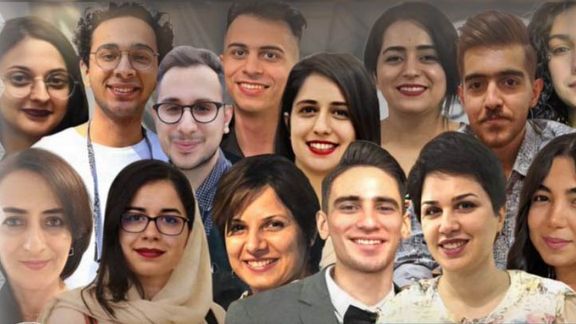
The Court of Appeals in northern Mazandaran province has sentenced 14 Baha’i citizens to imprisonment and fines.
According to the HRANA human rights news agency, Sanaz Hekmat Shoar and Bita Haghighi, two Baha’i citizens, were each sentenced to three years in prison and additional fines.
The news agency also announced that twelve other defendants in this case, named Mani Ghoi-Nejad, Negar Darabi, Sam Samimi, Mahsa Fathi, Samieh Gholi-Nejad, Majir Samimi, Anis Sanaei, Afsnaneh Nematian, Basir Samimi, Hengameh Alipour, Golin Falah, and Nazanin Goli were sentenced to a fifty-million-toman fine (approximately 1,000 dollars) in exchange for the initial sentence of two years and one month.
These Baha’i citizens were arrested in August 2022 in Mazandaran province but were released on bail months after.
At the time of their arrest, the Ministry of Intelligence released a statement, accusing these citizens of being members of an espionage organization and claiming that two of them had received training from Israel.
According to HRANA annual report, from the total human rights reports regarding the violation of religious minorities’ rights, 64.63% belonged to the violation of the rights of Baha’is.
The Baha’i faith is not recognized as a legitimate religion by Iranian authorities, leading to systematic and longstanding violations of the rights of Baha’is in the country.
Approximately 300,000 Baha'is reside in Iran, and they frequently document a pattern of regular rights violations. The violations encompass harassment, forced displacement from their residences and businesses, and unequal treatment regarding government employment and access to higher education.
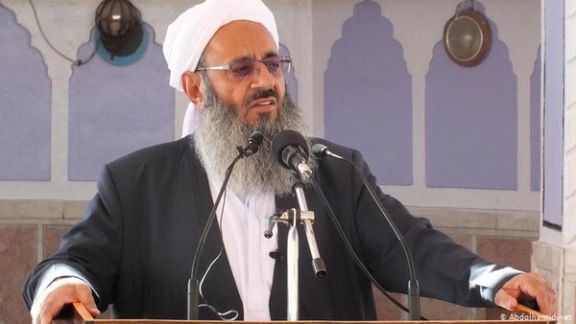
Iran’s top Sunni cleric Mowlavi Abdolhamid called for “justice” during his weekly sermons referring to a massacre which took place in the city of Khash last year.
According to Amnesty International, during the "Bloody Friday of Khash" in November 2022, the Islamic Republic forces shot live ammunition at protesters and worshippers, killing at least 18 people, including two children, and injuring dozens.
In his remarks on Friday, Abdolhamid expressed the Iranian people's demand for "justice" and the punishment of the culprits behind the massacre. The incident occurred a few weeks after a similar attack by security forces in the provincial capital Zahedan, where about 100 protesters were killed by the regime’s security forces.
Human rights media outlet Haalvsh has also reported the presence of military forces and intense security measures around Zahedan's Makki Mosque and the city of Khash.
Abdolhamid emphasized the importance of justice and freedom in Iran in his Friday sermon. He stated that existing discrimination and inequalities must be addressed, and political prisoners, including writers, journalists, and intellectuals, should be released and criticism should be tolerated.
After the bloody attacks on protesters in Zahedan and Khash, various cities in Sistan and Baluchestan province have been scenes of popular demonstrations every Friday over the past year.
Despite increased pressure, the protests have continued with authorities blocking the internet and access to communication in the province. Rights groups say, the internet has been shut down continuously since the widespread anti-government protests began in September 2022.
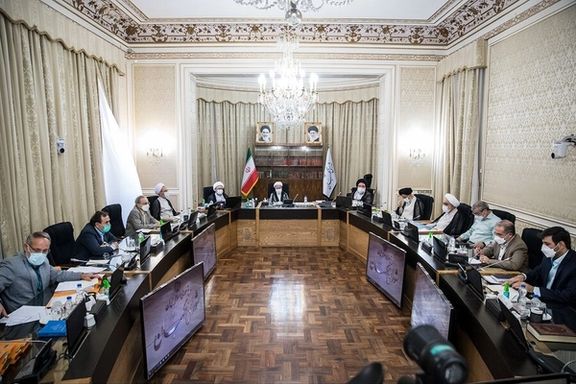
Less than four months before Iran's parliamentary elections, there is still a lot of confusion among various political groups about the vetting of candidates.
The Iranian regime has established a politically charged vetting process, which has grown progressively capricious and opaque, preventing even loyal politicians from becoming candidates.
Reformists and moderate conservatives are deeply skeptical about the fairness of this vetting process. They accuse the Interior Ministry and Guardian Council of arbitrarily disqualifying all but the ultraconservative candidates. They describe this process as "engineering the elections."
This week, Ezzatollah Yousefian Molla, a former centrist lawmaker, claimed that individuals from former President Mahmoud Ahmadinejad's inner circle and some members of the ultraconservative Paydari Party, which aims to secure the majority of seats in the Iranian parliament (Majles), have infiltrated the executive committee of the Interior Ministry. This committee is responsible for shortlisting over 24,000 candidates who have registered for the elections scheduled for March 1.
Molla said in an interview with Khabar Online website in Tehran that the vetting should take place in an atmosphere that would not be indicative of any bias in favor of a certain political group. He argued that the executive committee is exhibiting such bias that all candidates are now hoping for a fair evaluation by the Guardian Council, although the Guardian Council is notorious for arbitrary disqualifications in Iran's political circles.
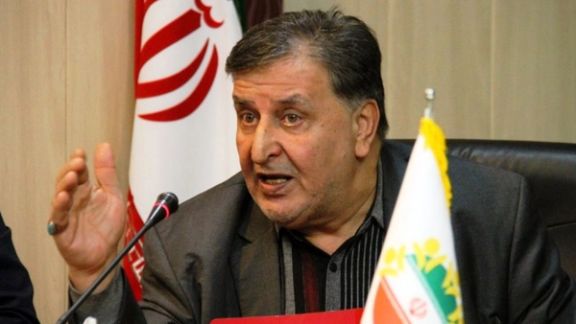
Molla also pointed out that none of the candidates are aware of who their political rivals are because the new election law has classified the candidates' list as confidential. This issue needs addressing.
Recently, Interior Minister Ahmad Vahidi announced the names of the members of the executive committee, including a range of ultraconservative former officials, many of whom were Ahmadinejad's cabinet ministers with links to the Paydari Party, allied with Ahmadinejad during the first round of his presidency (2005-2009). Others in the committee include traditional conservative figure and former Trade Minister Yahya Al-e Es'haq and a few other less well-known individuals. The minister characterized the committee members as "popular" figures.
Outspoken former lawmaker Gholam-Ali Jafarzadeh Imanabadi also expressed concern about nearly all of the committee members' link to Paydari. He said the combination of the committee was indicative of Paydari's deep infiltration of the Interior Ministry ahead of the election.
At the same time, while some reformists and moderates still wish to take part n the elections and form at least a minority in the next Majles, the main competition appears to be taking place among ultraconservatives and Majles Speaker Mohammad Bagher Ghalibaf's inner circle who call themselves "neo-cons."
For the first time Ghalibaf has given his political group a name: The Association of Awakened Revolutionaries. According to Etemad newspaper, the group recently held its "congress,”, however, President Ebrahim Raisi refused to accept Ghalibaf's invitation to be present at the congress, where the most prominent guest was former Majles Speaker Gholam Ali Haddad Adel. Etemad wrote that Raisi's absence was a clear sign of his rivalry with the new group.
Sobh-e No, a newspaper linked to Ghalibaf said 4,000 people took part in the congress, several sources pointed out that venue where it was held could accommodate a maximum of 800 people. Sobh-e No, sarcastically labeled those who refused to attend the new group's congress "political outcasts."
Outspoken ultraconservative cleric Hamid Rasai criticized Ghalibaf's team and said the meeting cost a lot of money and it is not clear how much more Ghalibaf is going to spend on his campaign before the elections in the next four months. Other conservative figures such as political commentator Mohammad Mohajeri called on Ghalibaf to be transparent on the costs of his group's congress.
In another development, IRGC's newspaper, Javan, criticized Paydari, Ghalibaf and other conservative figures and political groups for their "illogical and biased" behavior, including their mutual mudslinging.
On a lighter note, conservative candidate Mohammad Reza Bahonar, who recently voiced concern about his potential disqualification by the Guardian Council, has promised in an interview to help the reformists to get through the Council's vetting process. His move hints at the possibility of an alliance with reformists and resembles the Persian proverb: "If the bald man was a good doctor, he should have first tried to grow hair on his own skull."
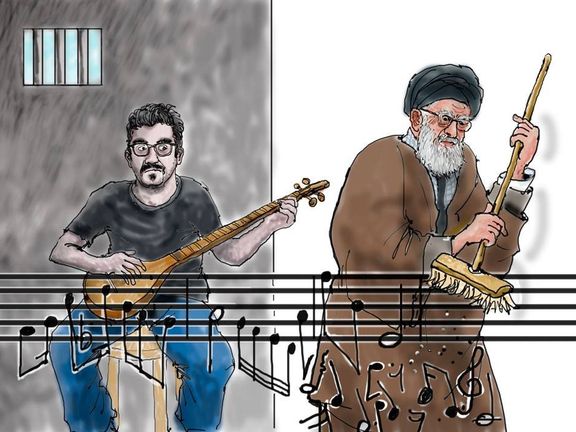
Mehdi Rajabian, a dissident Iranian composer, has won the United Nations International Art Contest for Minority Artists.
This annual award is given to three artists who address "topics related to the intersectionality of various forms of discrimination and compound discriminations."
Rajabian is the first composer to win this award. A visual artist from Nigeria and a painter from Spain were the two other winners of the award this year.
"Happiness is a collective event, and unfortunately, no one is happy here [Iran]. The situation has changed completely after the recent protests. No award can be a criterion for determining an artist's artistic value, but it can certainly be a platform for the voice of human rights and artistic freedom,” said Rajabian in response to his win.
The UN Art award was presented to Mr. Rajabian in absentia because he is restricted from leaving Iran.
The artist has been detained and faced prison sentences in previous years because of his work. Rajabian was arrested in 2013 for releasing underground music and was charged with “propaganda against the government”. He was put in solitary confinement for three months and then released on bail.
Rajabian was again arrested in 2015 for his album The History of Iran Narrated by Setar, a lute-like instrument used in traditional Persian music.
In Tehran’s notorious Evin prison, Rajabian began a 40-day hunger strike that led to his release on parole in 2017.
Rajabian was arrested again in 2020 for his album Middle Eastern but did not spend time in jail and was released on bail. He was accused of “encouraging prostitution” because females were singing in the album.